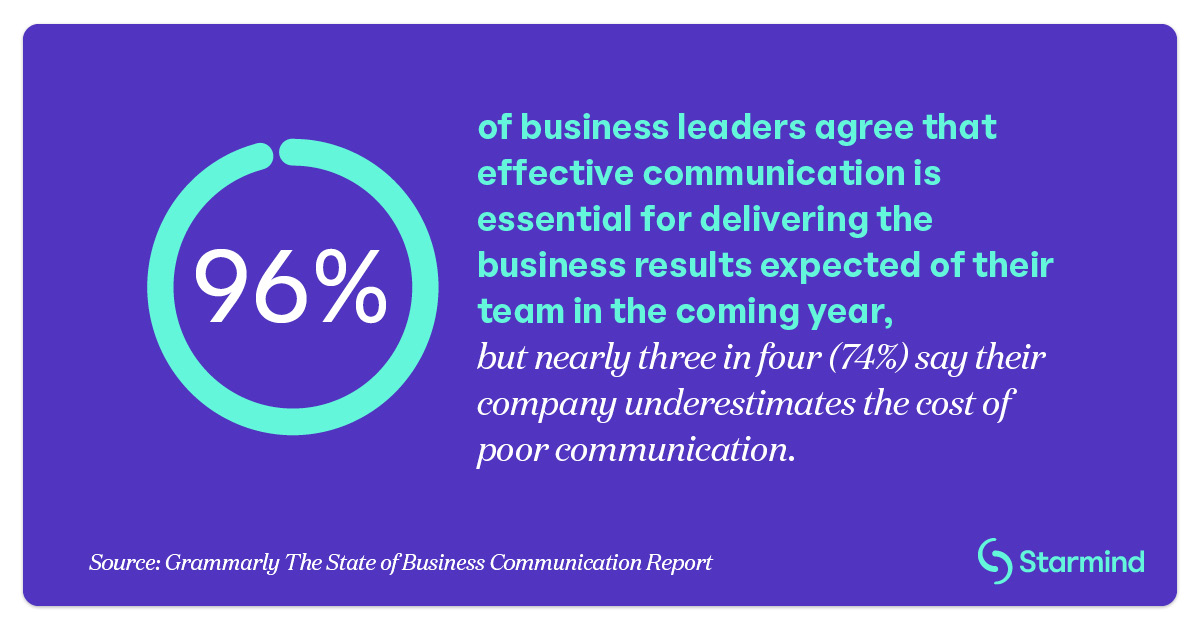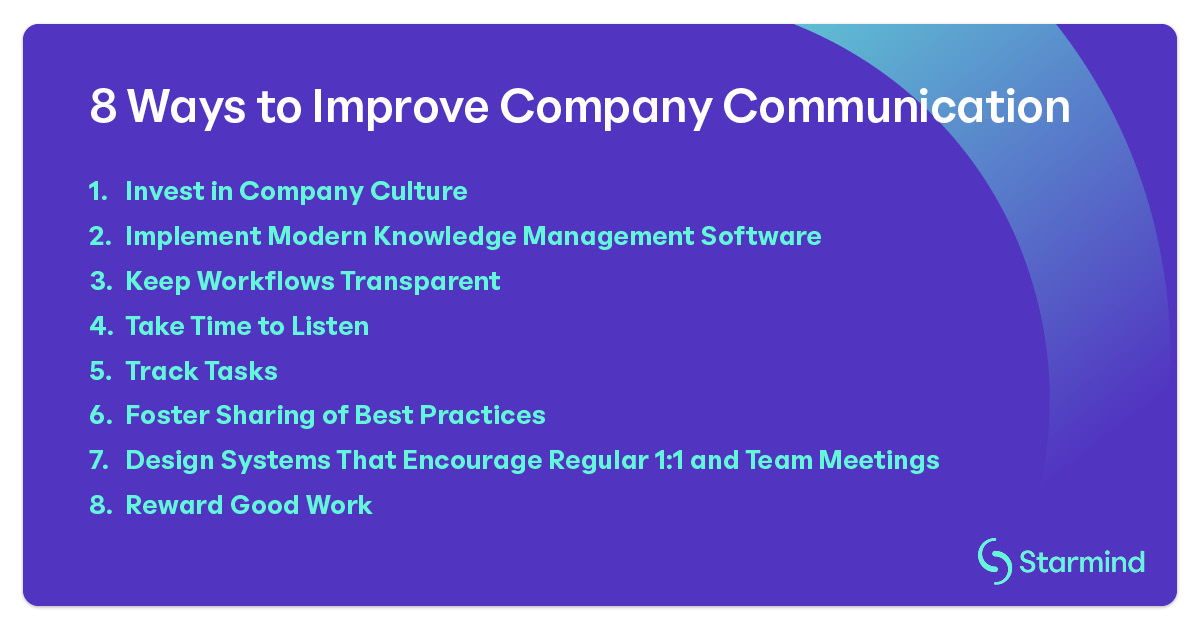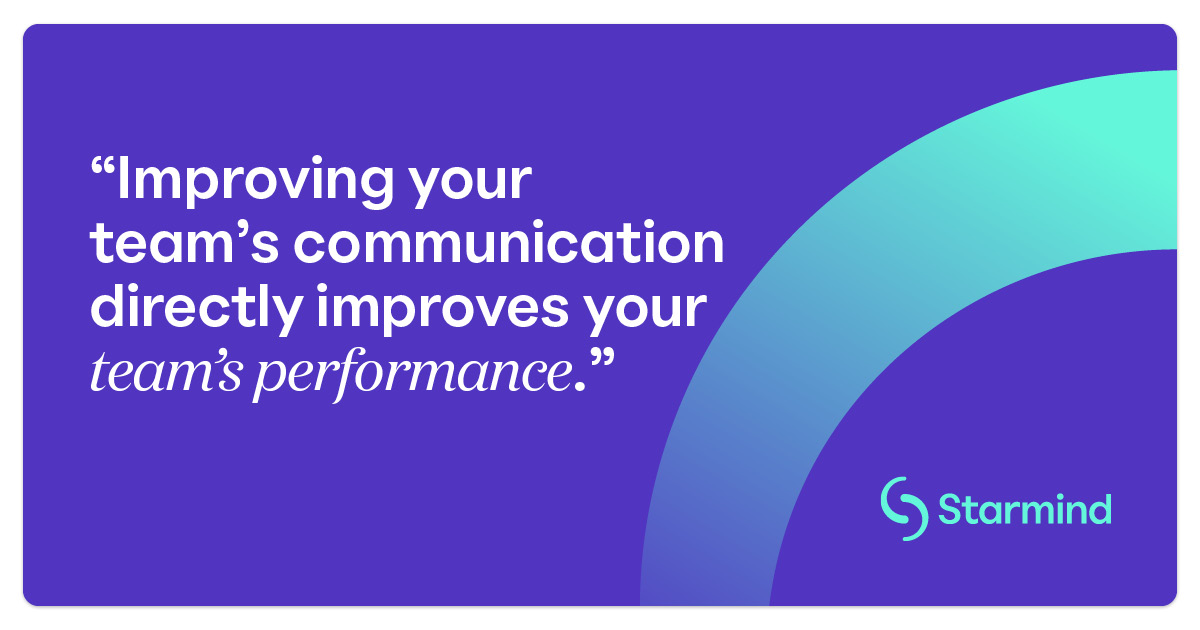Contents
Every organization has a unique culture with distinct language and communication patterns that affect how employees access and share information and build relationships. Improving communication in the workplace can give you a lasting advantage over your competitors, especially for systems that scale.
Challenges related to effective communication aren’t new. However, recent changes in work environments, including the shift to hybrid and remote teams, have highlighted the importance of systems to connect teams with the support they need. A recent study from Grammarly and The Harris Poll found that while almost 100% of business leaders understand how effective communication drives desired business outcomes, 74% also said their company fails to appreciate the negatives of poor communication.
Learn more about the importance of improving corporate communication and the role modern knowledge management systems can play in scaling knowledge transfer in the enterprise.

Why Is Effective Communication Important in the Workplace?
Effective communication is one of the most important aspects of any business, but too many organizations fail to cultivate good practices because they’re focused on other priorities. These organizations miss out on the benefits of strong communication, such as improved speed and quality of your teams’ work throughout the enterprise.
When your teams communicate productively, there’s less time wasted searching for answers or seeking assistance for commonly raised problems. Teams can resolve issues independently because the knowledge has been effectively retained and shared. If team members need to discuss a new question or issue, they can quickly find colleagues who can offer assistance or advice.
Quality communication also leads to faster innovation, accelerated sales cycles and improved service desk support. These teams possess greater access to the knowledge and resources needed to solve existing problems and plan for new opportunities.
Improved sales performance
Communication is essential for sales and manifests in a variety of ways. Marketing efforts direct your messaging toward potential customers as they learn more about your business, and your sales team continues that communication along the buying journey. As relationships develop, customers will have questions or need additional information. Effective communication and knowledge sharing allow your employees to work together to quickly provide answers or solutions that could be the difference between winning and losing a deal.
It’s also important to share best practices and wins with your team. Learning from the success of others can inspire and motivate your team to secure more sales.
Research shows that sales teams sharing best practices achieve 82% of their sales quota, while those that don’t achieve just 32% of their quota.
Better R&D performance
Innovation requires a thorough understanding of a particular product or situation, as well as a collaborative effort from all involved parties. R&D teams that don’t regularly communicate goals, processes and progress can find themselves performing unnecessary work or wasting time searching for information that isn’t available or accurate.
R&D teams are also increasingly geographically distributed, sometimes working across borders and time zones. These distributed teams need to be equipped to find information and self-resolve issues without always turning to colleagues who don’t share the same location or schedule. An overarching challenge is that up to 80% of knowledge within organizations is undocumented. Effective communication can help ensure key information is stored and accessible, and that people know how to contact subject matter experts for help.
More efficient help desks
Many service desk requests could be self-resolved with effective communication and support from resources like a knowledge base. Unfortunately, answers aren’t easy to find in many organizations, and many employees fall back on service desk tickets instead of communicating their problems with the appropriate person or group. These excess tickets take time away from your support teams, who must repeatedly resolve similar tickets.
In fact, common issues account for the majority of service desk queues, with up to 80% of these tickets being standard, repeatable questions. While the resolution process for each of these might be simple, the time involved with manually addressing each ticket can quickly add up. This can lead to delays resolving more important issues that could be avoided with more effective and clear communication.
 8 Ways to Improve Company Communication
8 Ways to Improve Company Communication
Invest in Company Culture
Your company culture consists of the norms, behaviors and values that define your organization. Your shared organizational language is a key component of your culture.
Every company has its own unique terms, phrases, acronyms and language that set it apart from other businesses. Define these cultural elements so that everyone knows how to use them to communicate effectively and accurately. Don’t leave gaps, or employees will define these terms themselves — potentially leading to confusion, delays and costly mistakes.
Behaviors are your culture in action. Infusing healthy communication behaviors into your culture reinforces good knowledge collaboration habits and aligns everyone on cultural values.
Implement Modern Knowledge Management Software
Traditional knowledge management relies heavily on documentation. This leads to slow, manual processes that reduce productivity and can frustrate your team members. Data can quickly become redundant, outdated or trivial.
With a modern knowledge management solution, you can leverage the power of artificial intelligence (AI) to build a real-time knowledge network and give your team on-demand access to answers. Such knowledge management software can also help facilitate effective communication by connecting knowledge seekers with subject matter experts who can provide additional information.
Keep Workflows Transparent
Your teams benefit from being aligned with overall strategy and goals. Achieving that alignment requires transparency in workflows. Regularly review and communicate progress and performance against individual, project and overall goals. All projects should have clear instructions and expectations such as timelines, budgets and other key performance indicators (KPIs).
A culture of open communication encourages proactive discussion, where team members feel safe raising questions or concerns before they become issues. This transparency can also help team members understand their role and how it contributes to the project or overall organization.
Take Time to Listen
Mastering knowledge sharing won’t happen in one strategic meeting — employees need time to acclimate to new practices and platforms. As employees work through this process, offer constructive feedback that helps them adopt and master the improved communication processes. Additionally, ask for feedback as you implement communication platforms and define your organizational language.
There are many ways to discover what’s working and where communication breakdowns are still occurring. Reports, focus groups and pulse surveys are among the ways to analyze employee engagement.
However, not everyone will be comfortable sharing their perspective in a public forum like a focus group. Distribute anonymous surveys to find out what communication channels, platforms and tactics are working best. Include open-ended questions to solicit detailed feedback and suggestions for improvement. Those findings can be developed further in focus groups or taken to management for implementation.
Track Tasks
When team members understand their roles and responsibilities, and how their work is connected to a project’s success, their workplace communication will be more relevant, on task and effective. Along with tracking tasks to be done, provide regular updates on KPIs and what’s been accomplished to help improve employee engagement and motivation.
Foster Sharing of Best Practices
Encourage every team member to participate in developing and defining good communication behaviors. Empowering employees to exchange ideas and answer questions can reinforce the power of connection in your organization. A modern knowledge management system can make these contributions easier to make and create a lasting impact, while also allowing for anonymous input.
Design Systems That Encourage Regular 1:1 and Team Meetings
Managers need guidance on what meetings they should be having, who should attend and when they should happen.
Managers might host daily team standups, for example, where employees share their updates and raise concerns. One-on-one meetings between managers and individual employees will happen on a less frequent cadence. These meetings will focus on employee performance and can include discussion of communication issues and sharing information.
Regular meetings, whether with the full team or with individual team members, will help managers build better relationships with employees, monitor communication practices and make adjustments as needed.
Reward Good Work
An important part of effective business communication is acknowledging and rewarding good work. Implement formal and informal systems to recognize achievements and praise high-performing team members. Highlight their contributions by broadly communicating positive results.
Use performance reports to identify additional successes and find opportunities to reward and motivate your team. Non-monetary incentives such as social or peer-to-peer recognition are also great ways to encourage positive communication.
 Drive Business Success by Improving Communication
Drive Business Success by Improving Communication
Improving your team’s communication directly improves your team’s performance. Teams that communicate effectively feel safe asking questions and are confident they can quickly receive helpful answers. This allows employees more time to do their main tasks instead of wasting time and resources trying to search for answers or reinventing the wheel. Employees are engaged and have the resources they need to succeed.
As you prepare to improve communication in your workplace, learn more about how technological innovations will disrupt how we connect and communicate with each other. Discover the future of communication technology.



